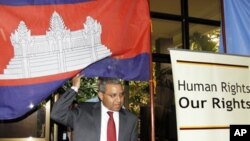The United Nations Special Rapporteur for human rights wrapped up his fourth visit to Cambodia on Thursday saying significant issues remained unresolved.
Surya Subedi said his fourth visit to Cambodia had produced a mixed bag of results, with limited government cooperation on measures for judicial reform that he had recommended after his last trip here in June.
On Thursday Subedi highlighted freedom of expression and land rights as key ongoing issues.
Phnom Penh has for several years pursued its perceived critics through the courts, with some people jailed or forced overseas to avoid prison sentences handed down by a compliant judiciary.
Subedi said there were still significant problems with freedom of expression, and spoke of his concerns that the space to express criticism was narrowing.
He said the peaceful expression of opinion should not be dealt with under the criminal code.
“Those holding public positions should be willing to accept criticism for their decisions. Criticism is not a crime, but an exercise of freedom of conscience, and an act of intelligence,” said Subedi.
Subedi was in Cambodia on a 10-day visit to assess how effectively parliament upholds human rights. He will report on that aspect later this year.
During his stay he met senior government officials, including Prime Minister Hun Sen.
The UN special rapporteur for human rights also spoke with donors, representatives from civil society, members of the political opposition and ordinary Cambodians.
On the subject of land rights, Subedi said the government needed to ensure improvements were made.
Tens of thousands of mainly poor Cambodians have been thrown off their land in recent years as the rich and powerful have exploited their position to grab the increasingly valuable resource.
Subedi did praise an ongoing effort by the government to improve the framework around which land is dealt with, but said the problem in Cambodia was typically not a lack of laws.
“The challenge in Cambodia as far as I’m concerned is more a matter of the implementation of the existing laws than not having some laws in place in the first place,” he added.
After Subedi completed his third visit in June, he drafted a series of recommendations to reform the judiciary. He had found that it faced what he called “tremendous challenges” in delivering justice for ordinary Cambodians.
He said Thursday that he was encouraged by the government’s acknowledgment of problems with the judiciary, and its agreement that those needed to be addressed.
But Subedi implied Phnom Penh had largely failed to do much to improve the judicial system, telling the media he would have preferred better cooperation from the government in implementing his recommendations.
Government spokesman Phay Siphan told VOA that Phnom Penh acknowledged the judiciary was inadequate, but said improvements took time.
Among the changes already underway, Phay Siphan said, are moves to improve the skills of existing prosecutors and efforts to boost training for new judicial staff.
Subedi is scheduled to leave Cambodia on Friday.




